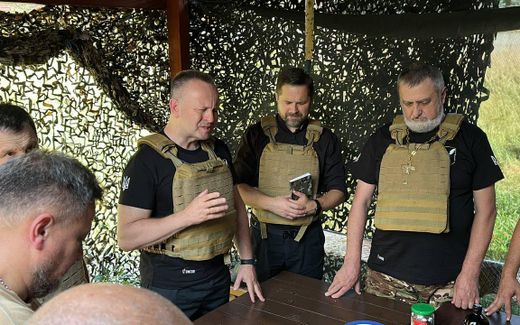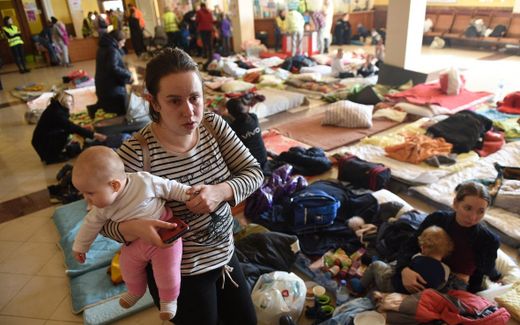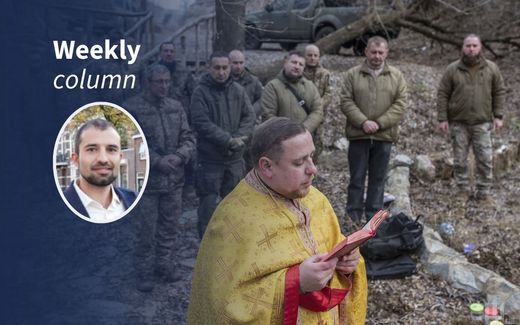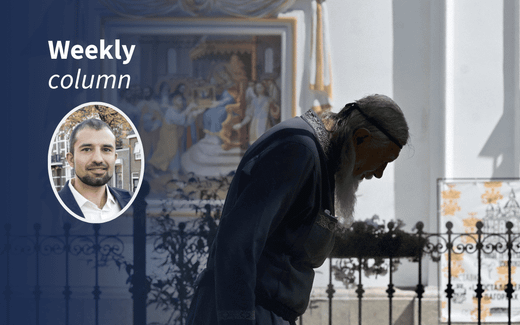Ukrainian believers fight for faith amid repression

Opinion
Churches in Ukraine lie in ruins. Communication between communities has been cut and believers are paranoid, because their phones can be checked at any time. Christians in the Russian-occupied territories of Ukraine are in deep crisis.
Christians in Ukraine’s occupied territories are experiencing a deep crisis. They have to deal with unprecedented challenges, such as isolation from Ukrainian churches, fear of surveillance, the disappearance of communities, and the destruction of church buildings. Yet, some communities endure.
In the occupied territories in the Donetsk, Luhansk, Kherson, Zaporizhzhia regions, and Crimea, religious life has been deeply shaken by the control of occupying forces. Church communities, once centres of spiritual life, now endure isolation, fear, and destruction.
Protestant churches, particularly Baptist ones, have faced widespread decline and the physical obliteration of their sanctuaries. The lives of believers are burdened not only by material losses but also by relentless pressure from the occupying authorities and a pervasive fear of communication and information sharing, paralysing normal community activities. The situation with churches in Ukraine’s occupied territories reminds us of the persecution of Christians in the Soviet Union during the 1920s and 1930s when religious communities endured isolation, destruction of church buildings, and repression. Like then, believers today are compelled to fight for their faith amid fear, secrecy, and systematic suppression of religious freedom.
This deep humanitarian and spiritual crisis strikes the essence of human freedom. Therefore, we must highlight the fate of believers facing great trials in their struggles to hold on to their faith.
Information
A defining feature of religious life in these territories is the isolation of local churches from Ukraine’s broader ecclesiastical structures. This disconnection stems from the inability to maintain ties with central religious organisations in Ukraine-controlled areas. The occupying administration actively blocks coordination or information exchange between communities on either side of the frontline.
People live with the constant awareness that their devices could be inspected at any moment.
Therefore, church leaders and believers are forced to operate independently, without support from the Ukrainian Baptist Union. This situation leads to disorganisation and a weakening of religious life. Besides, the isolation not only complicates church activities but also fosters a sense of detachment from the wider religious community that once provided inspiration and strength.
In addition, people are afraid of using phones or sharing information. They live with the constant awareness that their devices could be inspected at any moment. Occupation forces have the power to confiscate gadgets, monitor calls, and scrutinise messages, photos, or documents.
Consequently, believers and pastors avoid discussing church matters, planning services, or sharing community updates via phone. Even a simple notice about a Sunday service can arouse suspicion from the authorities. This pervasive control forces people to minimise communication, deepening isolation and making community life exceedingly difficult.
Physical destruction has become a tragedy for several churches in these regions. Dozens of buildings have been damaged by combat, demolished by explosions or artillery, or seized by the occupying authorities. Some church buildings have been exploited as warehouses, military sites, or propaganda venues. Structures that survive cannot be maintained due to a lack of funds and resources — repairing a roof or windows is an insurmountable task in areas with a shattered economy and limited supplies. These losses strip believers of places to pray and symbolise the erasure of cultural and spiritual heritage.
Maintaining churches in such conditions is nearly impossible.
Life in the occupied territories is extraordinarily harsh. Many towns lie in ruins: homes, roads, and infrastructure destroyed. People survive without food, water, electricity, or heat. The economy is in shambles—jobs are scarce, and those who remain work for meagre pay or food. Maintaining churches in such conditions is nearly impossible. Believers who once donated to the church now need help themselves, while pastors juggle ministry with securing their families’ survival.
Severe blow
Statistics reveal the devastating impact of occupation on church communities. Of the 320 churches active in these territories before the war, 110 Baptist churches —over a third of the region’s religious centres— have ceased to exist. The reasons vary: some communities dissolved due to mass exodus as believers fled from the war zones, and others quit under pressure from authorities who ban Protestant churches, labelling them “sectarian” or “Western agents.” Some simply couldn’t endure the war and economic hardship. This decline is not just a loss of spiritual hubs but a severe blow to communities that long upheld people’s morale in tough times.
Russian occupying forces and authorities blatantly disregard religious freedom as part of their broader policy to suppress all freedoms in these territories. The banning of Protestant groups, confiscation of church property, and persecution of believers constitute systematic human rights violations. As a result, not only religious freedom but also freedom of speech, assembly, and expression are vanishing.
Yet some communities persist. They hold secret gatherings in private homes, avoiding public services that might draw attention. These meetings are acts of courage, as breaking “rules” risks fines or arrests. Believers support each other orally, shunning digital communication to avoid traces. This fight for faith amid repression and ruin testifies to the resilience of the human spirit, though it comes at a steep cost. Yet, this tragedy is part of the broader devastation of cultural and spiritual life, with consequences that will linger for years. Without liberation, the fate of these believers remains tragic.
Therefore, this situation demands greater international attention. The violation of religious freedoms in the occupied territories should be raised more often on global platforms like the UN or the Council of Europe, as it represents not just a humanitarian crisis but a challenge to the principles of democracy and human rights worldwide.
Related Articles










